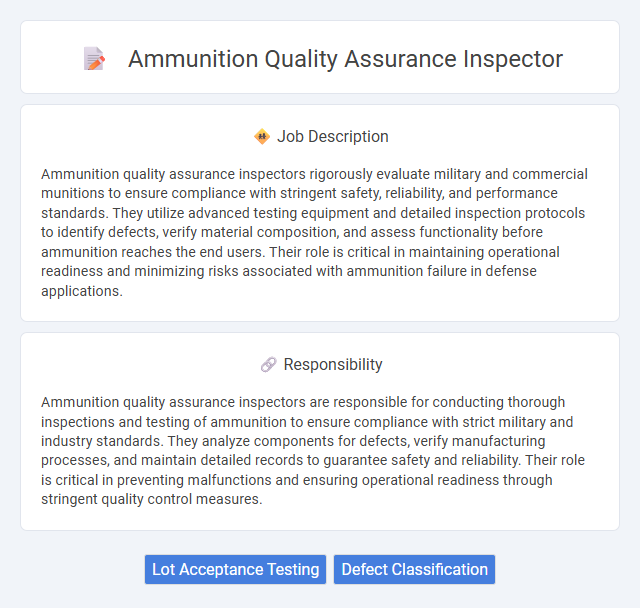
Ammunition quality assurance inspectors rigorously evaluate military and commercial munitions to ensure compliance with stringent safety, reliability, and performance standards. They utilize advanced testing equipment and detailed inspection protocols to identify defects, verify material composition, and assess functionality before ammunition reaches the end users. Their role is critical in maintaining operational readiness and minimizing risks associated with ammunition failure in defense applications.
Individuals who possess strong attention to detail and a methodical mindset are likely suitable for the role of an Ammunition Quality Assurance Inspector. Candidates with a high level of responsibility, physical fitness, and the ability to remain calm under pressure may be better equipped to handle the rigorous safety standards and precise inspections required. People who lack patience or have difficulty adhering to strict protocols may face challenges in meeting the demands of this critical position.
Qualification
Ammunition Quality Assurance Inspectors must possess a thorough understanding of military specifications and safety standards related to ordnance and explosives. Qualifications typically include a high school diploma or GED, supplemented by specialized training in quality control, hazardous materials handling, and ordnance inspection procedures. Experience in logistics, manufacturing, or military service enhances the ability to identify defects and ensure compliance with rigorous safety protocols.
Responsibility
Ammunition quality assurance inspectors are responsible for conducting thorough inspections and testing of ammunition to ensure compliance with strict military and industry standards. They analyze components for defects, verify manufacturing processes, and maintain detailed records to guarantee safety and reliability. Their role is critical in preventing malfunctions and ensuring operational readiness through stringent quality control measures.
Benefit
Ammunition quality assurance inspectors likely experience improved safety outcomes by ensuring strict adherence to military and industry standards. Their role probably offers opportunities for skill development in technical evaluation and regulatory compliance. Job stability and competitive benefits may be common due to the critical nature of maintaining ammunition reliability.
Challenge
The role of an Ammunition Quality Assurance Inspector likely involves the challenge of maintaining rigorous safety standards while efficiently identifying defects in various munitions under strict deadlines. Inspectors probably face the difficulty of staying updated with evolving regulations and technological advancements to ensure compliance and operational readiness. Balancing meticulous attention to detail with the pressure of high-stakes environments is expected to test both technical skills and decision-making abilities.
Career Advancement
Ammunition Quality Assurance Inspectors play a crucial role in maintaining the safety and reliability of munitions through rigorous testing and inspection processes. Mastery of complex quality control standards opens pathways to senior inspection roles, specialized technical positions, and supervisory careers within defense and manufacturing industries. Advancing in this field often requires certifications in quality management and a deep understanding of military and industry regulations, enhancing prospects for leadership and strategic roles.
Key Terms
Lot Acceptance Testing
Lot Acceptance Testing (LAT) is a critical responsibility for Ammunition Quality Assurance Inspectors, ensuring that each batch of ammunition meets stringent military and industry standards before distribution. Inspectors conduct comprehensive physical, functional, and chemical evaluations to verify compliance with specifications such as dimensional accuracy, propellant stability, and projectile consistency. Accurate documentation and detailed reporting during LAT support traceability and enhance reliability in ammunition performance across operational environments.
Defect Classification
Ammunition quality assurance inspectors specialize in defect classification to ensure the safety and reliability of munitions. They analyze physical and functional flaws, categorizing defects based on severity, type, and compliance with military standards. Accurate defect classification enables timely corrective actions and maintains operational readiness.
 kuljobs.com
kuljobs.com